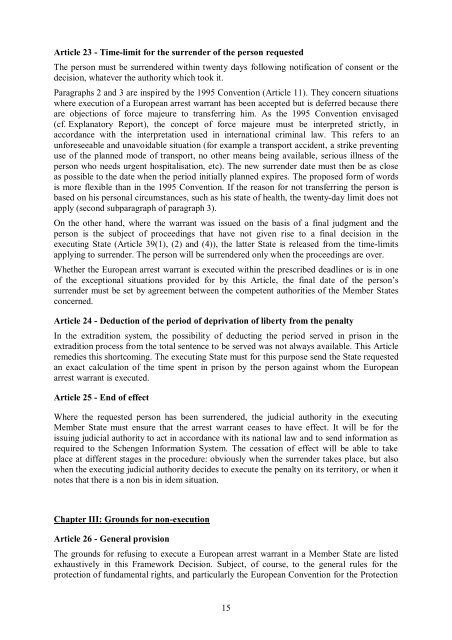the European arrest warrant - Statewatch
the European arrest warrant - Statewatch
the European arrest warrant - Statewatch
Create successful ePaper yourself
Turn your PDF publications into a flip-book with our unique Google optimized e-Paper software.
Article 23 - Time-limit for <strong>the</strong> surrender of <strong>the</strong> person requested<br />
The person must be surrendered within twenty days following notification of consent or <strong>the</strong><br />
decision, whatever <strong>the</strong> authority which took it.<br />
Paragraphs 2 and 3 are inspired by <strong>the</strong> 1995 Convention (Article 11). They concern situations<br />
where execution of a <strong>European</strong> <strong>arrest</strong> <strong>warrant</strong> has been accepted but is deferred because <strong>the</strong>re<br />
are objections of force majeure to transferring him. As <strong>the</strong> 1995 Convention envisaged<br />
(cf. Explanatory Report), <strong>the</strong> concept of force majeure must be interpreted strictly, in<br />
accordance with <strong>the</strong> interpretation used in international criminal law. This refers to an<br />
unforeseeable and unavoidable situation (for example a transport accident, a strike preventing<br />
use of <strong>the</strong> planned mode of transport, no o<strong>the</strong>r means being available, serious illness of <strong>the</strong><br />
person who needs urgent hospitalisation, etc). The new surrender date must <strong>the</strong>n be as close<br />
as possible to <strong>the</strong> date when <strong>the</strong> period initially planned expires. The proposed form of words<br />
is more flexible than in <strong>the</strong> 1995 Convention. If <strong>the</strong> reason for not transferring <strong>the</strong> person is<br />
based on his personal circumstances, such as his state of health, <strong>the</strong> twenty-day limit does not<br />
apply (second subparagraph of paragraph 3).<br />
On <strong>the</strong> o<strong>the</strong>r hand, where <strong>the</strong> <strong>warrant</strong> was issued on <strong>the</strong> basis of a final judgment and <strong>the</strong><br />
person is <strong>the</strong> subject of proceedings that have not given rise to a final decision in <strong>the</strong><br />
executing State (Article 39(1), (2) and (4)), <strong>the</strong> latter State is released from <strong>the</strong> time-limits<br />
applying to surrender. The person will be surrendered only when <strong>the</strong> proceedings are over.<br />
Whe<strong>the</strong>r <strong>the</strong> <strong>European</strong> <strong>arrest</strong> <strong>warrant</strong> is executed within <strong>the</strong> prescribed deadlines or is in one<br />
of <strong>the</strong> exceptional situations provided for by this Article, <strong>the</strong> final date of <strong>the</strong> person’s<br />
surrender must be set by agreement between <strong>the</strong> competent authorities of <strong>the</strong> Member States<br />
concerned.<br />
Article 24 - Deduction of <strong>the</strong> period of deprivation of liberty from <strong>the</strong> penalty<br />
In <strong>the</strong> extradition system, <strong>the</strong> possibility of deducting <strong>the</strong> period served in prison in <strong>the</strong><br />
extradition process from <strong>the</strong> total sentence to be served was not always available. This Article<br />
remedies this shortcoming. The executing State must for this purpose send <strong>the</strong> State requested<br />
an exact calculation of <strong>the</strong> time spent in prison by <strong>the</strong> person against whom <strong>the</strong> <strong>European</strong><br />
<strong>arrest</strong> <strong>warrant</strong> is executed.<br />
Article 25 - End of effect<br />
Where <strong>the</strong> requested person has been surrendered, <strong>the</strong> judicial authority in <strong>the</strong> executing<br />
Member State must ensure that <strong>the</strong> <strong>arrest</strong> <strong>warrant</strong> ceases to have effect. It will be for <strong>the</strong><br />
issuing judicial authority to act in accordance with its national law and to send information as<br />
required to <strong>the</strong> Schengen Information System. The cessation of effect will be able to take<br />
place at different stages in <strong>the</strong> procedure: obviously when <strong>the</strong> surrender takes place, but also<br />
when <strong>the</strong> executing judicial authority decides to execute <strong>the</strong> penalty on its territory, or when it<br />
notes that <strong>the</strong>re is a non bis in idem situation.<br />
Chapter III: Grounds for non-execution<br />
Article 26 - General provision<br />
The grounds for refusing to execute a <strong>European</strong> <strong>arrest</strong> <strong>warrant</strong> in a Member State are listed<br />
exhaustively in this Framework Decision. Subject, of course, to <strong>the</strong> general rules for <strong>the</strong><br />
protection of fundamental rights, and particularly <strong>the</strong> <strong>European</strong> Convention for <strong>the</strong> Protection<br />
15
















